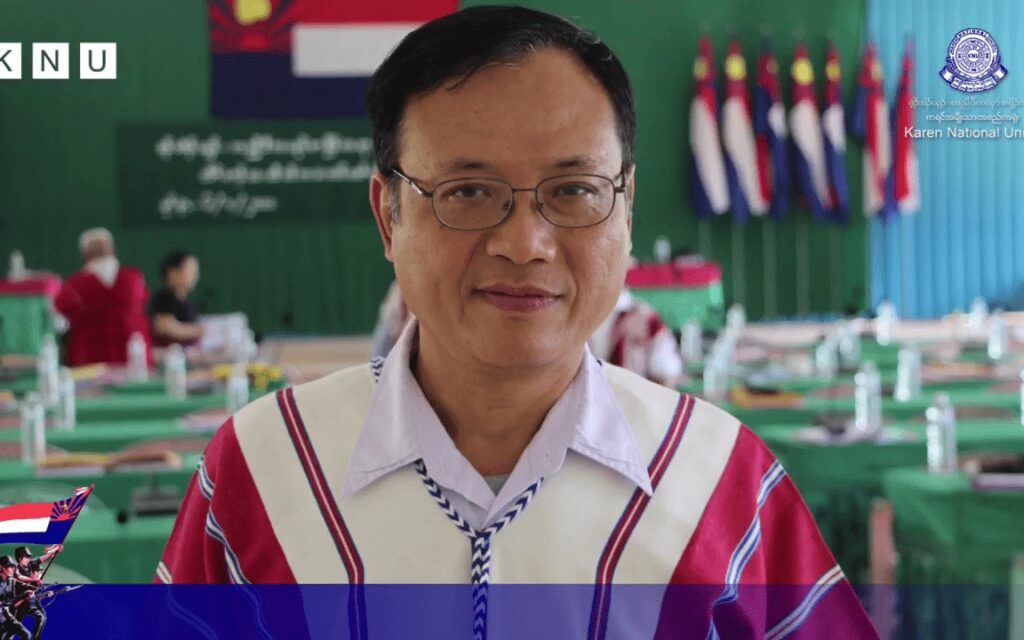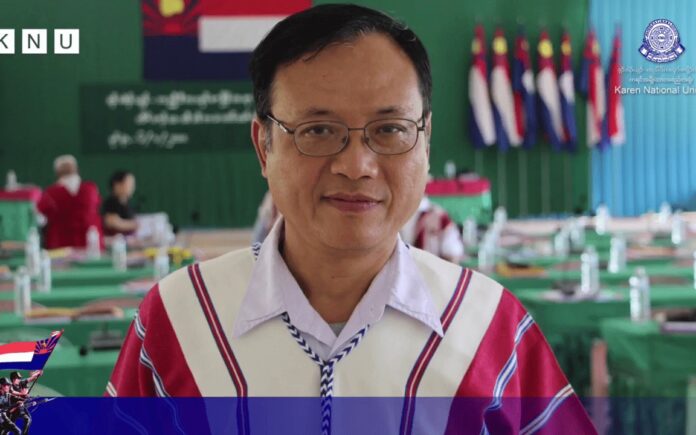After the military coup in 2021, the situation of the junta ground forces deteriorated significantly. Their combat capabilities declined, and their morale was greatly affected. To counter this and restore the morale of these ground troops, the regime has been using airstrikes for over three years to instill fear and terrorize the people.

In Karen National Union (KNU) areas and other ethnic regions, particularly in areas with intense armed conflicts, the military junta council has been using air strikes to target places with civilians, resulting in an increasing number of civilian casualties and deaths.
In this interview, the spokesperson of the Karen National Union (KNU), Padoh Saw Taw Nee, talked about the airstrikes targeting ethnic areas and civilian settlements by the military council.
Q: The military council continues airstrikes in ethnic regions, including KNU territories, Shan, Rakhine, and Karenni areas, resulting in mass civilian casualties. What do you have to say about the actions of the military council?
A: The military council has been conducting operations in various regions. The use of airstrikes isn’t something new; it has been a consistent tactic since the 2021 coup. They rely on air attacks whenever their ground troops struggle in battles. Despite their repeated attempts, they haven’t achieved significant success, but they continue these war crimes without regard for the consequences.
Q: The military council has stated they would respond as necessary in areas where armed groups are present and warned civilians to be cautious for their safety. What’s your view on whether the military council might intensify airstrikes without sparing civilians?
A: The statement about responding to armed groups means they intend to regain control of those towns and villages occupied by the armed groups. The way they do this is by targeting civilian structures like towns, villages, schools, and religious buildings rather than legitimate military targets, leading to an increased rate of civilian deaths. They continue this without adhering to international standards and norms, showing complete disregard for war crimes.
Q: The military council now focuses more on air attacks. Does this indicate a change in strategy? How do you see this shift?
A: As mentioned earlier, using airstrikes isn’t new. Since the 2021 coup, we’ve observed that military ground forces have weakened, and their morale has deteriorated. To uplift the spirits of their troops, they have been using airstrikes for over three years to spread fear among the people. This tactic isn’t new but becomes more intense over time.
Q: Despite the airstrikes targeting civilians, we haven’t seen a robust international response. What kind of pressure should the international community apply, and what should be done regarding these mass killings?
A: The international community should take decisive action against these acts, which are clear violations of human rights and constitute war crimes. However, the lack of effective action so far has prolonged this situation. A strong response from the international community could help restrain the military council’s actions.
From the international perspective, these acts, which include killings, violence against the public, and severe human rights violations, clearly qualify as war crimes. The international community should have taken effective action against this long ago. We believe that only by effectively addressing this issue will the military regime’s actions become less aggressive. However, since this hasn’t happened yet, we still find ourselves in a position where we have to continue speaking out about it.
Q: How is your organization preparing to defend against these airstrikes? And how should civilians protect themselves? What measures are you taking to support and protect the public?
A: As airstrikes become more frequent, civilians rely on their experience to find ways to protect themselves. However, to provide more effective protection, it’s necessary to implement more effective civilian defense systems. This remains a challenge due to limited resources, so we provide warnings and encourage everyone to stay alert. In the meantime, civilians need to build bomb shelters or underground bunkers. However, to protect themselves from more powerful bombs, such as 500-pound or 1,000-pound bombs, we need even more secure and strong underground shelters. Since this heavily involves technological aspects, it won’t happen immediately. However, we will continue to make efforts in this area.
Q: Finally, what would you like to say about the intensified airstrikes targeting ethnic regions?
A: In the end, the military regime’s actions show that it is determined to continue this path. Despite international condemnation, without decisive action from the international community, the military regime continues its brutal tactics unchecked. From our perspective, our revolution involves the entire public, and we must prevail. Regardless of challenges and whether or not we receive international support, since the beginning of this revolution, we have made up our minds to never back down. However, at this moment, especially on the ground, the military regime is facing significant losses. As a result, rather than trying to regain its former power, the military junta troops are inflicting more suffering on the people. When they continue their tactics of violence and oppression against the public, it becomes clear to us what path we must take. We must continue with our efforts, fully aware of the sacrifices required. We cannot afford to give up.

